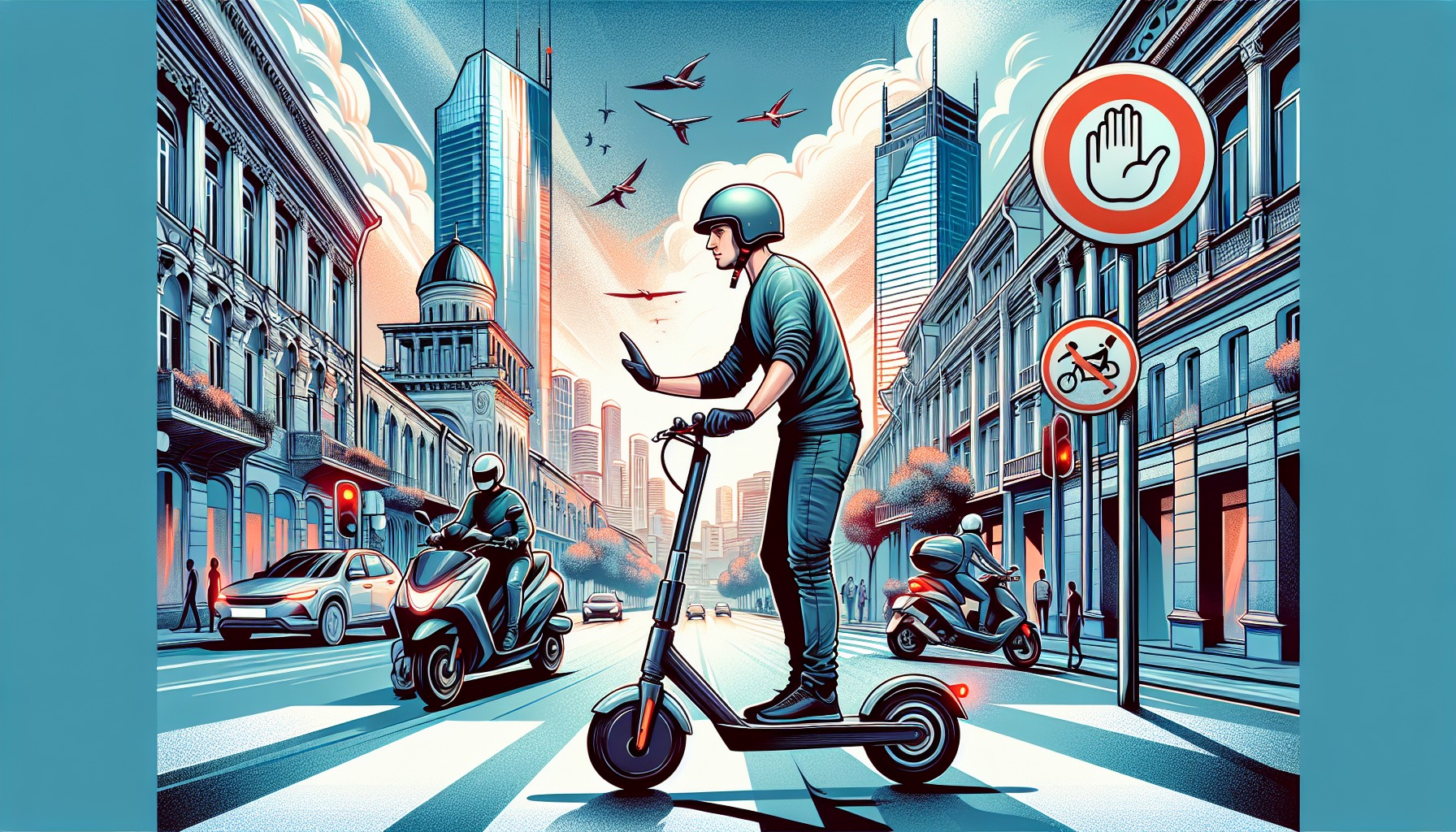Navigating the Georgia rules of the road for moped scooters starts here. Understand licensing, know the safety laws, and grasp the necessary regulations to ensure your ride is safe and lawful. Straightforward insights into Georgia’s legalities for moped and scooter enthusiasts unfold in this guide.
Key Takeaways
In Georgia, a moped is defined as a motor-driven cycle with an engine up to 50 cc and a top speed of 30 mph; mopeds are exempt from registration, while scooters must be registered and comply with standard vehicle laws.
Moped and scooter riders in Georgia must adhere to safety regulations including mandatory helmet use and are not allowed on highways or roads where the speed limit exceeds 35 mph.
Scooter owners are required to have minimum liability insurance coverage in Georgia, and accidents involving mopeds and scooters are treated similarly to those involving traditional vehicles in terms of liability determination.
Understanding Georgia's Moped and Scooter Laws

In Georgia, engine size is the basis for differentiating between mopeds and scooters within the laws. A moped is legally defined as any motor-driven cycle with an engine not exceeding 50 cubic centimeters and must be incapable of exceeding 30 miles per hour on level ground. Georgia state law exempts mopeds from vehicle registration, recognizing them as motor-driven cycles with specific engine capacity limits.
Licensing Requirements for Mopeds and Scooters
Regarding licensing, Georgia riders are subjected to particular age requirements. Moped riders must be at least 15 years old and possess a valid driver’s license, instructional permit, or limited permit. To obtain a motorcycle license, scooter riders must be at least 17 years old. In addition, they are required to pass a knowledge test, road skills test, and a vision exam.
Additionally, it is deemed illegal to operate a moped with a suspended driver’s license in Georgia, as one must have an unexpired driver’s license to legally operate a moped in Georgia.
Registration and Tags
Unlike mopeds, which are exempt from registration in Georgia, scooters must comply with the same registration and tagging process as other motor vehicles. Mopeds with engines not exceeding 50 cubic centimeters are exempt from registration in Georgia. They do not require tags and are not subject to the vehicle registration and licensing provisions that apply to other motor vehicles.
Contrarily, in Georgia, scooters follow the same registration and tagging rules as other motor vehicles. Students using their own scooters for the Georgia Motorcycle Safety Program (GMSP) are required to have their scooters registered and insured; the scooters must also pass a safety check to be considered street legal.
Safety Regulations for Moped and Scooter Riders

Georgia’s safety regulations, also known as Georgia moped laws, aim to protect both the rider and other road users. To operate a moped, moped operators are legally required to wear a helmet, and mopeds are not allowed on limited access highways or roadways with minimum speed limits above 35 mph.
Given the heightened vulnerability of moped and scooter riders to accidents and injuries, compliance with safety regulations becomes imperative.
Helmet Use and Protective Gear
Specific rules dictate the use of protective gear by riders. Moped riders in Georgia are required to wear DOT-approved motorcycle helmets to ensure their safety while on the road. Additionally, children under the age of 16 in Georgia must adhere to the additional safety measure of wearing helmets that meet the standards set by the Georgia Department of Transportation when riding both mopeds and electric scooters.
Road Rules and Traffic Laws
Moped and scooter riders in Georgia, akin to other motorists, are obligated to adhere to the traffic laws. This includes:
stopping at stop signs
obeying traffic lights
yielding at intersections
pulling over for emergency vehicles
giving way to pedestrians
Furthermore, using smartphones while riding a moped is prohibited. Riders must pull over and park safely before using such devices.
Mopeds are also not allowed on highways or roads with speed limits exceeding 35 mph, as they are considered limited access highways with a minimum speed limit.
Insurance and Liability Considerations
Another significant facet of moped and scooter operation in Georgia relates to insurance. Owners and operators of scooters in Georgia must have insurance coverage including $25,000 for bodily injury per person, $50,000 per accident, and $25,000 for property damage. Additionally, when it comes to accidents involving mopeds and scooters, liability is determined by the same standards as in accidents involving traditional passenger vehicles.
Minimum Insurance Coverage
In Georgia, scooter owners are obligated to hold both bodily injury liability insurance and property damage liability insurance. The minimum coverage requirements are:
$25,000 per individual for bodily injury liability insurance
$50,000 per occurrence for bodily injury liability insurance
$25,000 per incident for property damage liability insurance.
Handling Accidents and Liability
The treatment of accidents involving mopeds and scooters aligns with that of motor vehicle accidents. In the event of a moped or scooter accident in Georgia, law enforcement will treat it as a motor vehicle accident and determine fault in the same way they do for other vehicles.
Riders of dockless scooters are personally liable for their medical costs and any damages or injuries they may cause to others if they are at fault in an accident. Compensation claims after electric scooter accidents might be contested by insurance companies, which may necessitate a legal process to resolve issues of responsibility and damages.
Electric Scooters in Georgia: Rules and Regulations

In Georgia, the popularity of electric scooters as a mode of transportation is on the rise. However, like mopeds and scooters, they are also subject to specific rules and regulations. Electric scooters are legal on streets, bike paths, and bike lanes in Georgia, but only on thoroughfares where the speed limit is 35 mph or less.
Riding electric scooters on sidewalks is strictly prohibited in Georgia, and it is against the law in Georgia to carry passengers on an electric scooter.
Licensing and Age Requirements
As per age and licensing requirements in Georgia:
Only those who are 15 years or older are permitted to operate an electric scooter.
Electric scooter operators in Georgia are not required to have a driver’s license.
There is no requirement for electric scooter riders to carry insurance in Georgia.
Road Usage and Safety Measures
Regarding road usage and safety measures, Georgia’s electric scooters and electric bicycles are restricted to single riders and are permitted on bike paths, bike lanes near roads, or roads where speed limits do not exceed 35 mph. Electric scooter riders must follow the same traffic laws as motor vehicles, which includes stopping at stop signs, obeying traffic lights, yielding at intersections, pulling over for emergency vehicles, and giving way to pedestrians.
Parking regulations for electric scooters include prohibitions against leaving scooters in certain areas, with potential fines for those who do not comply.
Moped and Scooter Education and Training

Moped and scooter riders significantly benefit from education and training. Rider education programs in Georgia offer scooter owners training, and successful completion of these programs may allow for a license waiver. To enroll in rider education courses, scooter owners must use their own scooters, which should have engines over 50cc but under 500cc, and be personally owned, registered, and insured by the participant.
Georgia Motorcycle Safety Program
Designed to minimize motorcycle crashes among novice riders and improve the basic and crash-avoidance skills of veteran riders, the Georgia Motorcycle Safety Program (GMSP) offers a variety of courses. GMSP provides a range of rider education programs, including the Basic Riders Course, the Basic Riders Course 2 License Waiver, and the Advanced Riders Course.
Scooters with engines below 500cc can participate in GMSP rider education programs, which may lead to license waivers for the owners.
Additional Resources for Riders
Beyond formal education and training programs, moped and scooter riders in Georgia have access to a myriad of additional resources. Online forums such as PeachtreeMopeds provide a platform for riders to discuss issues, share advice, and organize group rides. Local clubs, including the Atlanta Scooter Club, offer riders the opportunity to meet others with similar interests, and partake in organized events and scooter rallies.
Educational materials such as the Motorcycle Operator Manual from the Georgia Department of Driver Services provide valuable information on traffic laws, rider safety, and handling techniques for those with a valid driver’s license.
Summary
To summarize, understanding Georgia’s moped and scooter laws, safety regulations, and insurance requirements is crucial for any rider. From licensing and registration requirements to safety measures and traffic laws, these regulations are designed to ensure the safety of everyone on the road. For electric scooter enthusiasts, specific rules apply, including age requirements, road usage restrictions, and safety measures. Furthermore, education and training programs, such as those offered by the Georgia Motorcycle Safety Program, can be an invaluable resource for riders to enhance their skills and ride safely.
Frequently Asked Questions
What is the legal definition of a moped in Georgia?
In Georgia, a moped is legally defined as any motor-driven cycle with an engine not exceeding 50 cubic centimeters and must be incapable of exceeding 30 miles per hour on level ground. This definition is important to understand the regulations and requirements for operating a moped in the state.
What is the minimum age required to ride a moped in Georgia?
You must be at least 15 years old to ride a moped in Georgia.
Are helmets mandatory for moped riders in Georgia?
Yes, in Georgia, moped riders are legally required to wear a helmet.
Are electric scooters legal in Georgia?
Yes, electric scooters are legal in Georgia and are allowed on streets, bike paths, and bike lanes, but only on roads with a speed limit of 35 mph or less.
What are the insurance requirements for scooter owners in Georgia?
Scooter owners in Georgia are required to have insurance coverage with specific amounts, including $25,000 for bodily injury per person, $50,000 per accident, and $25,000 for property damage.

